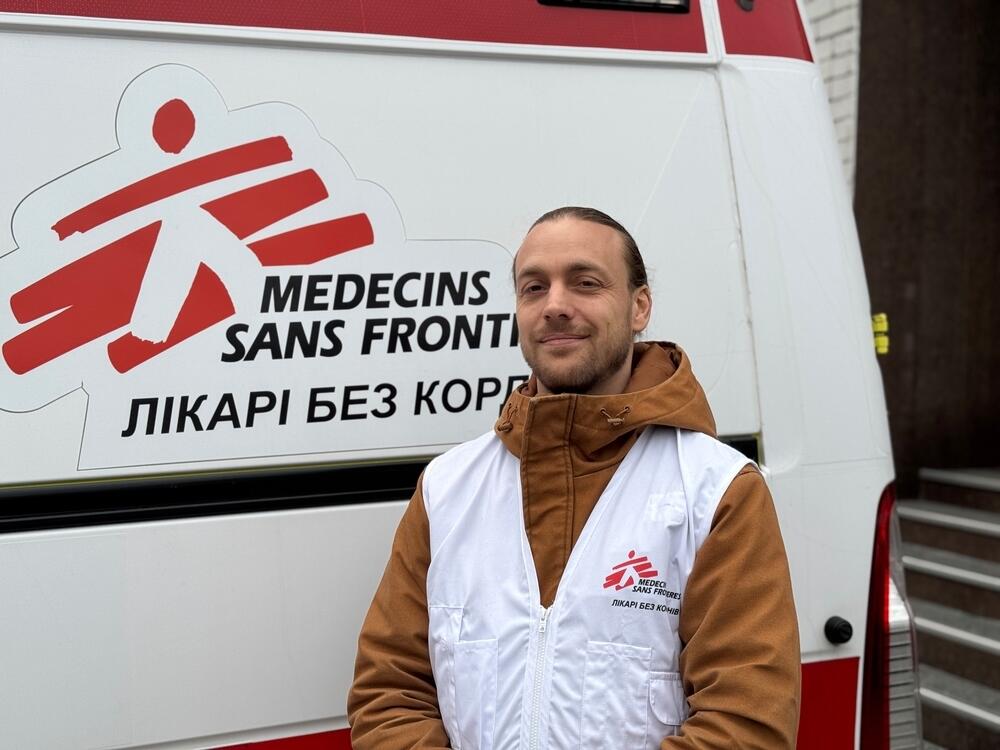Dublin resident and MSF staff Thomas Marchese speaks about three years of war in Ukraine
Thomas Marchese, MSF Head of Programmes in Ukraine, reflects on his time in Ukraine on the third anniversary of the war:
“In the first week of March 2022, I was transporting an ambulance to Ukraine. February 24th, 2022, the day Russia began its full-scale invasion of Ukraine, is a day I will never forget. I was at home in Ireland when I saw the news. Shortly afterwards, I received a call from our emergency department and jumped on the first flight to Geneva for a briefing. On February 25th, 2022, I arrived in Poland. One of Médecins Sans Frontières’ (MSF) first interventions was to collect two ambulances.
It took us a couple of days to prepare these ambulances with all the required supplies, and we crossed the border in the first week of March. The first days and weeks were chaotic. The Russian military forces were advancing very quickly. We decided to split our activities so that we could develop and apply a strategy in a short amount of time.
Some people on our team focused on assessing hospitals and their needs. Many towns were being evacuated, so our team assessed how we could support these evacuations. That's how the idea of a medical train came to us. It was really impressive to see how quickly the team prepared this train and made it operational to help and support the population during evacuations. Several cases from those first months in Ukraine come to mind.
First, I recall being part of the logistics team. One of our strategies was to implement energy autonomy kits in hospitals, these kits would allow them to continue functioning if there was a power cut. The frontline was advancing very quickly, and we saw that Sloviansk Hospital in Donetsk region would soon be in the red zone, and thus in danger from the shelling. After only a brief assessment by phone, we decided to go straight there and support the hospital with these energy kits. I remember it was a weekend, and unfortunately, the security situation was deteriorating rapidly during this time. We rushed to finish the job, whilst ensuring high-quality installation so the hospital could remain operational even during electricity, heating, or water shortages.
Russian military aircraft were flying above, and artillery was active nearby. We even felt the blasts from shelling. The second case that stands out is about Sviatohirsk in Donetsk region. This town was under Russian military occupation for several months. When Ukrainian forces retook the area, we arrived just a few days after intense urban fighting. We found a medical facility in disarray. Many windows were broken, bullet holes were visible on the walls, blood was on the floor, and everything was destroyed. It was chaos.
Our entire team could see the impact of the fighting inside the facility. Despite the difficult situation, one of our tasks was to make the facility ready for MSF medical teams to begin providing care and consultations. So, we did our job. After three years of war, our activities have, of course, completely changed.
More than 2,000 healthcare facilities have been damaged, and more than 400 have been completely destroyed during these three years of full-scale war. We constantly analyse the intensity of the war to understand the needs.
Now, we are in a different phase. For example, the train project, which initially focused on evacuations, has evolved into more of an ambulance referral service. MSF mobile clinics and ambulance referral teams are now now able to cover nearly the entire frontline — around 1,200 kilometres. We have 21 ambulances in our fleet. It's a massive and challenging operation that requires excellent organisation and planning.
With the continued attacks on healthcare facilities, the type of support that is needed has changed. Hospital teams and the Ministry of Health must continue to operate under immense challenges. One thing that will always stay with me — something that continues to impress and honour me — is the commitment, motivation, and efficiency of our team. Despite having only a short amount of time for preparation, they consistently set up high-quality operations and medical activities. "

